“Guiding a Community:” Unworking Community in Sandra Cisneros’ The House on Mango Street
Abstract
ABSTRACT: The present study revises communitarian boundaries in the fiction of Chicana writer Sandra Cisneros. Using the ideas of key figures in post-phenomenological communitarian theory and connecting them with Anzaldúa and Braidotti’s concepts of borderland and nomadism, this essay explores Cisneros’ contrast between operative communities that crave for the immanence of a shared communion and substantiate themselves in essentialist tropes, and inoperative communities that are characterized by transcendence or exposure to alterity. In The House on Mango Street (1984) the figure of the child is the perfect starting point to ‘unwork’ (in Nancy’s terminology) concepts such as spatial belonging, nationalistic beliefs, linguistic constrictions, and gender roles through a selection of tangible imagery which, from a female child’s pseudo-innocent perspective, aims to generate an inoperative community beyond essentialist tropes, where individualistic and communal drives are ambiguously intertwined. Using Cisneros’ debut novel as a case study, this article studies the female narrator as embodying both a community of one and Cisneros’ search for an intellectual Chicano community.
RESUMEN: El presente estudio revisa las fronteras comunitarias de la ficción de la escritora chicana Sandra Cisneros. Partiendo de presupuestos comunitarios postfenomenológicos y conectándolos con los conceptos de frontera y nomadismo de Anzaldúa y Braidotti, este ensayo explora el contraste que se da en Cisneros entre comunidades orgánicas que buscan la inmanencia a través de una comunión entre















